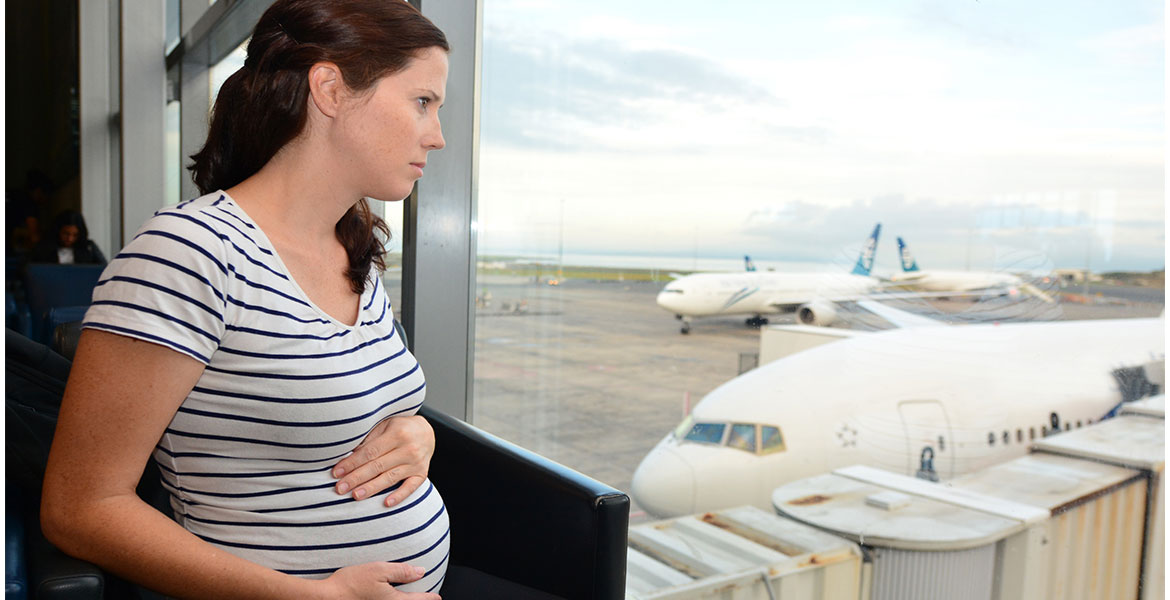
by Alex Digesu MD, PhD – Consultant Obstetrician & Gynaecologist, Specialist in Urogynaecology and Pelvic Reconstructive Surgery, at The Lindo Wing, Imperial Private Healthcare, London
One of the most common questions that a pregnant woman asks her GP or Obstetrician is whether or not it is safe to travel by plane.
 In this article, I will try to shed some light on this controversial subject and try to answer some of the most common concerns that women may have.
In this article, I will try to shed some light on this controversial subject and try to answer some of the most common concerns that women may have.
First of all, you will be glad to hear that in case of an uneventful healthy pregnancy, flying is absolutely safe for both mother and baby during most of your pregnancy.
In the first twelve weeks of pregnancy (the first trimester) the risk of miscarriage is higher (one in five) and nausea and tiredness are more commonly present, thus making the second trimester (week 14 to 28) the best time to fly. However, if you feel well and your doctor has no concerns, there is no reason why you should not fly.
Discover amazing places to take a Babymoon
If you decide to travel in the third trimester (29 weeks onwards), airlines will request a “permission to travel” letter from your doctor that should include: 1. your due date; 2. dates and location of your departure and arrival destination; 3. a statement that travel does not pose a health risk. Usually most of the airlines will need a doctor’s letter signed within 72 hours before you travel. The majority of airlines strongly recommend against travel at 39 weeks or later for domestic flights and require that travel is completed by end of 36 weeks (32-34 weeks in case of twin/multiples pregnancy) for international flights. Obviously if your pregnancy is considered by your doctor as “at high risk” then you should not fly.
Generally speaking, it is best to avoid flying during your final month, when you are more likely to go into labor even if your pregnancy is uncomplicated. Please consider the fact that many airlines would not even let a pregnant woman on board if she is too close to her expected date of delivery as they really do not want her to deliver while in the air! They may not have a clue what to do in the case of imminent labour. Please remember that if you go into labour while on the plane, there is no guarantee that any of the other passengers or crew will be trained and experienced to help you give birth safely! In case of an emergency, the pilot may have to divert the flight.
Therefore do discuss your travel plans with your doctor and check with your airline (as rules and restrictions can vary) before booking your flight.
While planning your trip there are some important recommendations that I would strongly suggest that you consider:
- Ask your doctor to provide a referral contact at your destination, if possible, in case of emergency;
- Do not forget to bring with you a copy of the clinical notes that include your age, date of last menstrual period, due date, the number and outcome of previous pregnancies, results of blood tests performed during your pregnancy, reports of ultrasound scans and if there are any ongoing obstetric problems;
- Check if you need any vaccinations and if these are safe to have during pregnancy;
- Make sure you have a European Health Insurance Card (EHIC), which entitles you to free treatment if you are travelling to Europe.
While on the plane remember to have a comfortable and healthy flight by:
- Wearing compression stockings (you can buy these in a pharmacy over the counter) to reduce the risk of blood clots (thrombosis) and leg swelling;
- Drinking plenty of water to stay hydrated;
- Adjusting the seatbelt when seated so that the strap lies below your bump;
- Walking around in the aircraft when possible and trying not to sit still for long time;
- Doing calf exercises while seated;
- Wearing comfortable shoes;
- Sitting in the middle of the plane preferably over the wing for a smoothest ride and on the aisle so you can get up easily;
- Avoiding caffeinated drinks (tea, coffee) as they have a diuretic effect.
One of the most common misconceptions that causes fear in pregnant women is the belief that metal detectors use X-rays, and are harmful for the baby. In reality, metal detectors use low frequency electromagnetic fields to look for weapons. Therefore unless you are carrying a gun, do not worry as this exposure is absolutely safe for everyone, including your baby. The same holds true for the wands that security personnel sometimes pass over passengers. In the United States, new body scanning machines have recently been introduced such as the “backscatter” machine, which uses low-level X-rays or the “millimeter wave” machine, which uses electromagnetic waves. However the Transportation Safety Administration (TSA) claims that these do not pose a risk in pregnancy as they emit less than 1/1,000 of the radiation given off in a standard chest X-ray, or the equivalent of two minutes of high-altitude flight.
Bear in mind that if you feel uncomfortable being scanned or have any safety concerns, you can ask for a physical “pat down” search instead.
Being in a pressurized cabin is also safe in pregnancy. In fact all airplanes are required by the Federal Aviation Administration (FAA) to maintain a standard level of cabin pressure (the equivalent of 5,000 to 8,000 feet). Therefore if you are a healthy woman with an uncomplicated pregnancy, the pressurized cabin will not harm you or your baby. The increased altitude and temperature in a pressurized cabin unfortunately may trigger and/or aggravate nausea.
In summary, if your pregnancy is straightforward there is no evidence that:
- Flying is harmful to you or your baby;
- The change in air pressure and/or the decrease in humidity are harmful to you or your baby;
- Flying causes early labour or your “waters to break”;
- Flying increases your risk of miscarriage;
- The slight increase in the amount of radiation you may be exposed to with occasional flights are harmful to you or your baby.
It is absolutely safe to fly before 37 weeks if you are carrying an uncomplicated single (one baby) pregnancy and before 34 weeks if you are carrying an uncomplicated twin/multiple (two or more babies) pregnancy.
However, if you are a frequent flier or a flight crew’s member, I would suggest you seek advice from your occupational health department.
With regards to develop deep vein thrombosis (DVT – a blood clot in your leg, calf or pelvis), there is evidence that while you are pregnant and for up to six weeks after the birth of your baby, your risk is higher if you are on a flight lasting more than eight hours. If you already have certain risk factors (such as a previous DVT or obesity) the risk of developing DVT is increased even more. If you are taking a short-haul flight (under four hours), you should not worry.
To reduce the risk of DVT it is advisable:
- To take regular walks;
- To drink plenty of fluids;
- To wear elastic compression stockings;
- To do calf exercises while seated;
- To take heparin (an injection which reduces the risk of you forming blood clots) administered by a doctor only on the day of the flight and for several days afterwards if you have an increased risk of DVT. Your doctor should also provide a letter to allow you to carry this medicine onto the plane.
Read about compression tights while flying
These are some of the most common medical complications which may contraindicate air travel in pregnancy and/or require special precautions:
- Increased risk of premature labour (going into labour before your due date);
- Severe anaemia with a haemoglobin of less than 7.5 g/dl;
- If you are affected with sickle cell anaemia (a condition which affects red blood cells) and you have recently had a sickling crisis;
- A recent fracture, especially if you wearing a cast as significant leg swelling can occur during the flight;
- A recent obstetric (vaginal) haemorrhage;
- An ear infection (otitis media) and sinus infection (sinusitis), since during pregnancy you are more likely to be congested (have a blocked nose). The lowered air pressure in the plane can also cause you to experience problems in your ears;
- A serious respiratory disease (lung problems), causing difficulty in breathing;
- If you have recently had surgery to your bowel, as sutures on the intestine could come under stress due to the reduction in pressure and gaseous expansion;
- Obesity
- Previous DVT
I hope I managed to answer your queries and to provide you all the information you need to plan your journey.
Remember to discuss your travel plans with your doctor, bring a copy of your antenatal notes with you, make yourself as comfortable as you can while on the plane and follow my suggestions. All will be ok but more importantly, do not forget your passport! I wish you all a nice journey.
Read about the Royal College of Gynaecologists’ latest advice on flying during pregnancy.
This information is based on:
the Royal College of Obstetricians and Gynaecologists (RCOG) Scientific Advisory Committee (SAC) Opinion Paper Air travel and pregnancy (published by the RCOG in December 2008). www.rcog.org.uk/files/rcog-corp/uploaded-files/SAC1AirTravelPregnancy2008.pdf.
www.rcog.org.uk/files/rcog-corp/uploaded- files/PIVenousThrombosis2007.pdf).
www.rcog.org.uk/files/rcog-corp/uploaded-files/PIEarlyMiscarriage2008.pdf).
NICE’s guidance on air travel and pregnancy Antenatal care : routine care for healthy pregnant women (March 2008), please see section 5.14, pp. 101 – 102.
Air travel during pregnancy. ACOG Committee Opinion No. 443. American College of Obstetricians and Gynecologists. Obstet Gynecol 2009; 114:954-5.
